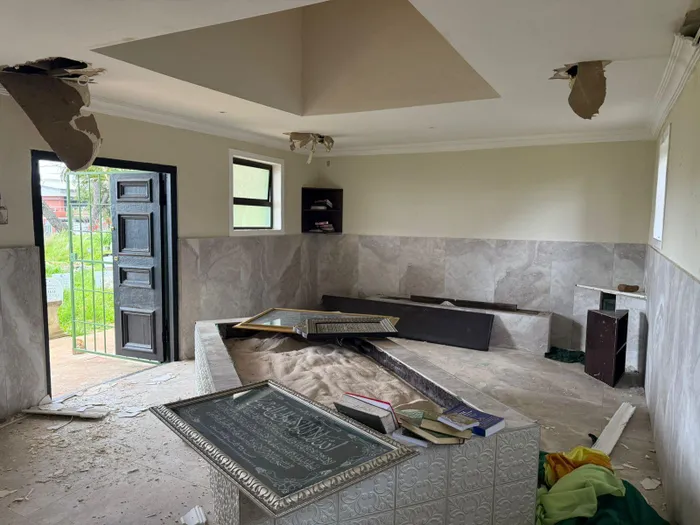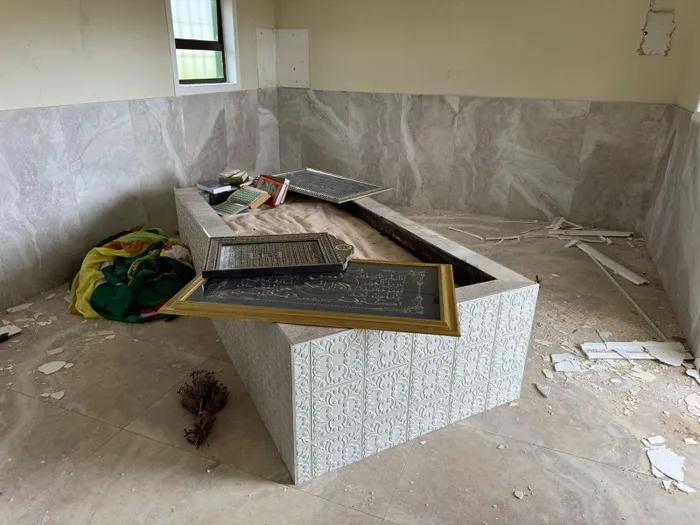Outrage over vandalism at Kramat of Sayed Moegsin Bin Alawi

Damage seen at the Kramat, which leaders have condemned as a violation of a site deeply rooted in spiritual and communal significance.
Image: Supplied
A break-in and act of vandalism at the Kramat of Sayed Moegsin Bin Alawi in Mowbray Cemetery has been strongly condemned by multiple religious and heritage organisations.
In a statement issued by the Moslem Cemetery Board on Wednesday, July 30, the Kramat, which is a formally recognised national heritage site, was unlawfully entered, vandalised, and desecrated.
The Kramat is situated within the grounds of Mowbray Cemetery and is considered sacred by the local Muslim community.
The board stated that this incident follows a recent theft at the same cemetery, involving a katal, a bier used for transporting the deceased with dignity.
They believe these acts show a “pattern of targeted criminality” that threatens religious reverence, heritage, and communal dignity.
They noted that these acts happened despite recent security upgrades at the cemetery, including CCTV, motion-sensitive alarms, and reinforced entry points.
According to the statement, the intruders damaged and removed burglar bars, light fittings, wiring, and the grave covering, leaving the area in disarray.
The Moslem Cemetery Board stated that it had contacted police, the Muslim Judicial Council (MJC), and the Cape Mazaar Society (CMS) to ensure that the matter is thoroughly investigated and prosecuted under relevant property and heritage laws.
In a statement, Faizal Sayed, chairperson of the Moslem Cemetery Board and secretary of the Burial Administration of the MJC, said the desecration represented a breach of physical security and a violation of the moral and cultural compact that underpins a civilised society.
“Sites of sacred and historical import, such as Kramats, are not passive relics of the past. They are dynamic embodiments of spiritual continuity and communal identity,” he said.
He added that the theft of the katal, followed by this incident, shows a “pattern of conduct that warrants rigorous criminal investigation.”
According to advocate Yusuf Khan Dalwai, public relations officer of the Cape Mazaar Society, they were “saddened and shocked” to discover the vandalism at the site.

The vandalism of the Kramat has been described as a shocking act against cultural and religious heritage.
Image: Supplied
“This is not only vandalism of a sacred site but an attack on our community. We call on the authorities to do a thorough investigation and bring the perpetrators to justice.”
The MJC also released a statement condemning the incident.
They described it as “an abhorrent act of vandalism” and said the Kramat is a symbol of spiritual heritage and historical continuity.
“This criminal act is deeply disturbing and must be understood as vandalism, theft, and the desecration of sacred heritage. The Kramat of Sayed Moegsin Bin Alawi is not only a site of Islamic significance, but a repository of the collective memory of the Muslim community of South Africa," president of the MJC, Sheikh Riad Fataar, said.
He urged the authorities to take the matter seriously and called on all communities to respect and protect sacred sites.
Faizal Sayed, in his capacity as secretary of the MJC’s Burial Administration, reiterated in the MJC’s statement that the incident signals a “deeper societal malaise” and a loss of respect for sacred spaces and the dignity of the deceased..
Provincial police spokesperson, Captain FC Van Wyk, confirmed the incident and that it was reported and registered at Woodstock Police Station.
"The break-in occurred between Tuesday, July 29 at 4.30pm and Wednesday, July 30 at 7am at a premises in Browning Road, Observatory. No suspects have been identified yet, and investigations are ongoing."
Captain Van Wyk added that anyone with information about the incident should contact Crime Stop on 08600 10111.
The Moslem Cemetery Board calls on the public, faith-based organisations, and civil society to remain vigilant.
Safeguarding sacred spaces is a shared responsibility that requires both security measures and community cooperation, it said.
Related Topics: